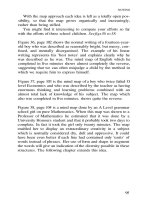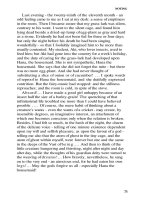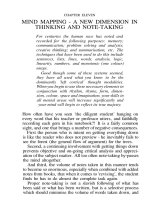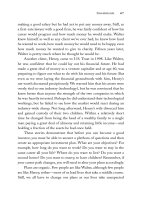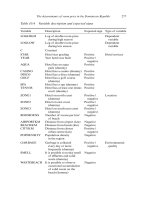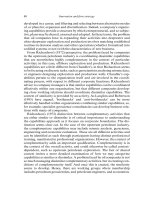tony buzan mind maps and making notes phần 4 pdf
Bạn đang xem bản rút gọn của tài liệu. Xem và tải ngay bản đầy đủ của tài liệu tại đây (1.03 MB, 10 trang )
NOTING
With the map approach each idea is left as a totally open pos-
sibility, so that the map grows organically and increasingly,
rather than being stifled.
You might find it interesting to compare your efforts so far
with the efforts of three school children. See figs 36 to 38.
Figure 36, page 102 shows the normal writing of a fourteen-year-
old boy who was described as reasonably bright, but messy, con-
fused, and mentally disorganised. The example of his linear
writing represents his 'best notes' and explains clearly why he
was described as he was. The mind map of English which he
completed in five minutes shows almost completely the reverse,
suggesting that we can often misjudge a child by the method in
which we require him to express himself.
Figure 37, page 103 is the mind map of a boy who twice failed O
level Economics and who was described by the teacher as having
enormous thinking and learning problems combined with an
almost total lack of knowledge of his subject. The map which
also was completed in five minutes, shows quite the reverse.
Figure 38, page 104 is a mind map done by an A Level grammar
school girl on pure Mathematics. When this map was shown to a
Professor of Mathematics he estimated that it was done by a
University Honours student and that it probably took two days to
complete. In fact it took the girl only twenty minutes. The map
enabled her to display an extraordinary creativity in a subject
which is normally considered dry, dull and oppressive. It could
have been even better if each line had contained only 'units' of
words instead of phrases. Her use of form and shape to augment
the words will give an indication of the diversity possible in these
structures. The following chapter extends this idea.
95
The mind maps on pages 97-100 represent a new method for
noting.
There are four of them, and they summarise the first four chapters of
the book.
A fifth page has been left blank for you to create a mind map of
Chapter 5 for yourself.
In these mind maps key words and images are linked to each other
around a main centre (in these cases, the overall theme of a chapter),
and a mental picture is built up of an entire thought structure.
• The theory and method for making these patterned notes is fully
outlined in sections B and C of chapter 4, starting on page 86.
• Use the notes for each chapter as a preview of what is to come; they
will make the reading of the chapter easier.
• After finishing a chapter, look at its patterns once again. This will
serve as a good review, and will help you to remember what you
have read.
101
Fig36 The 'best notes' in linear writing of a 14 year-old boy, and his
mind map notes on English. See text page 95.
102
Fig 37 Mind map by a boy who twice failed O level Economics. See
text page 95.
Fig 38 Mind map by an A level grammar school girl on pure
Mathematics. See text page 95.
104

